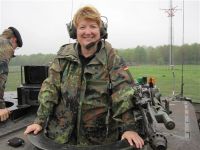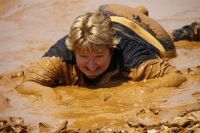FORT BELVOIR, Va. — When Betty Hoapili was selected to attend the Department of Defense’s Executive Leadership Development Program, she got the chance to walk in a warfighter’s shoes.
The 23-year civil service veteran, a logistics program analysis officer on the Defense Logistics Agency’s Air Force Customer Support Team in the Operations and Sustainment Division of DLA Logistics Operations, was looking to complement her career path when she responded to the program’s call for nominations through DLA’s Executive Development Program.
One of the program requirements was to complete a staff study. Hoapili’s study focused on the Defense Department’s acquisition community and its ability to handle the impending wave of retirements projected in the next five years.
“I looked at whether or not the [defense] acquisition career field is headed for … a ‘brain drain’ and developed possible courses of action,” she said.
Hoapili said she prepared herself for the various types of training and temporary duty assignments, which took place one to two weeks each month for 10 months — a total of 95 days. She also needed to keep up with her regular workload, which she said helped her learn about juggling priorities.
At the program orientation, Hoapili said, her instructors told participants they were lucky to have been selected.
“One of the things they said to us was, ‘You 61 people have won the lottery,’ [because] there were 600 applicants, she recalled. The participants were split into six teams, including one military member per team, Hoapili said.
The first “deployment” was to core training at the Southbridge Conference Center in Southbridge, Mass., where Hoapili said team members were challenged physically, mentally and emotionally.
Team members had to complete a fitness test – sit-ups, push-ups and pull-ups – to ensure they could safely participate in the program’s demanding activities.
“[Early] the next morning … those who had not passed any aspect of the physical testing had to report to the gym area and were going to focus on additional training,” she said. Although Hoapili and her teammates had passed the physical test, she said she went to the gym anyway to help other program members prepare for the re-test. It was a proud moment when those members passed the test too, Hoapili said.
At another deployment, she volunteered for a swimming challenge at the Basic Underwater Demolition/SEAL School at the Naval Special Warfare Center in Coronado, Calif. The challenge involved swimming in full military gear out to a Navy SEAL positioned in the ocean.
“It was very scary because of the significant undertow and the crashing waves. … There was one point where I thought, ‘I wonder if I’m going to drown.’ [But] when I made it back to the beach and the rest of my teammates were cheering me, I knew I’d challenged myself to do my best. That’s why I [volunteered],” Hoapili said.
One of the program’s key tenets involves showing participants they can do more than they’d thought, she said.
“That’s the starting point for any good leader, … knowing your capabilities and pushing yourself … to see what you can do when faced with a tough challenge, … to go one step beyond what you thought you could do,” she said.
“How to adapt to changing circumstances is part of the skill set that this program was teaching me,” Hoapili said.
After the swimming challenge, program members were required to drag an inflatable raft up and down the beach and then complete an obstacle course.
Despite being driven to physical exhaustion on that California beach, Hoapili said, her biggest challenge was yet to come at the U.S. Army Ranger School, at Fort Benning, Ga. Standing on top of a 75-foot tower and stepping off to rappel down was more of a mental challenge for Hoapili, one she wasn’t sure she could do.
“That first step took a lot of faith on my part, [but I had] confidence in my equipment and confidence in the instructors that were there … assuring me they had my back,” she said.
During times when she was less confident in her abilities, Hoapili said, she repeated a mantra to herself.
“Leaders are tough; leaders are strong; leaders can do these things,” she said.
Still, Hoapili credits her accomplishments to her team’s never-ending support.
“I was blessed with an amazing team of people. We called ourselves ‘Team High Five.’ … Those 10 people became a family. … We were there for each other. It goes back to working on behalf of warfighters; [they] were my warfighters, and I didn’t want let them down, and we refused to leave anyone behind,” Hoapili said.
Each year during graduation ceremonies, one class member is awarded special recognition. This year, Hoapili was awarded that distinction and presented the Rosemary E. Howard Leadership Award. She was unaware she would be receiving the peer-nominated award.
“To be nominated by your peers is an extreme honor,” Hoapili said. “When I read the award’s inscription: ‘Based on Courage, Determination, Leadership and Professionalism,’ I was very humbled,” she said.
Hoapili said she took two lessons away from her experience in the program. The first was a reinforcement of a lesson learned from her father.
“My dad is a retired Air Force chief master sergeant; he always taught me the backbone of our armed forces is our enlisted corps,” she said. “That was reinforced to me … because at every deployment, the individuals who were teaching me, … training me, … equipping me were all [noncommissioned officers].”
The second take-away is the power of teamwork, she said.
“Not only did my teammates have my back, but trained, amazing warfighters had my back as well. [I value] the whole concept of courage and compassion and competence in terms of strong leadership and what’s expected of us as future civilian leaders,” she said.
Gary Gonthier, a performance-based logistics program manager in DLA Aviation’s Strategic Customer Engagement Branch was also on Hoapili’s team.
“Betty was a welcome member of the team. … [She] is socially gregarious, which manifests itself in the precious attention she paid to both organizational and personal details,” he said.
The combination of Hoapili’s interpersonal style, which included offering praise and other affirmations to participants, set against a backdrop of structure, schedules and order made her a compassionate leader, Gonthier said.
“She left no doubt when team members performed well, yet also made clear those instances when things didn’t go so well. Betty always placed the concern of others above her own self-interest,” he said.
This year marked the first occasion that program participants traveled to Kuwait. Though they spent just 72 hours there, both Hoapili and Gonthier agreed that the program instilled them with a greater appreciation for military service members.
Gonthier said the program provides civilian personnel with a hands-on approach to learning what warfighters do on a daily basis.
“The … members from each of the services are truly dedicated to what they do and [are] wholeheartedly supported by the family that follows … them,” he said. “They are highly trained and ready to do whatever it takes to defend this nation, including giving their lives. We should never forget that.”
Hoapili agreed and said it’s an experience civilians rarely, if ever, get.
“It’s invaluable in enhancing my understanding of what our warfighters go through, the sacrifices they make … on our behalf, and how important it is for us to do our jobs extremely well so they can do what we’re asking them to do,” she said.
Recently, Hoapili found out she was selected for another training opportunity – the Industrial College of the Armed Forces. She credits DLA for giving her the chance to display her leadership qualities in the ELDP. At DLA, developing employees’ skills and abilities is a high priority, so high it falls into agency Director Navy Vice Adm. Alan Thompson’s list of top initiatives.
“I’m anxious now to give back to DLA for having given me this opportunity,” Hoapili said.
She added that she’s a “huge proponent” of the ELDP program and noted that as the Rosemary E. Howard Award winner, she gets to go to orientation for next year’s program and speak to incoming participants.
“In so many ways, I do wish I was doing it again — not so much the crawling through the mud, … but it’s a once-in-a-lifetime experience,” she said. “I look at the pictures and think, ‘How did I do that?’ But you do it one day at a time and with a whole lot of help from your friends.”
Nominations for the DoD Executive Leader Development Program are solicited annually around September through the DLA Executive Development Program. Information is available on the EDP webpage at http://www.hr.dla.mil/resources/workforce/executive.html.
Source:
U.S. Department of Defense
Office of the Assistant Secretary of Defense (Public Affairs)

 von
von 

